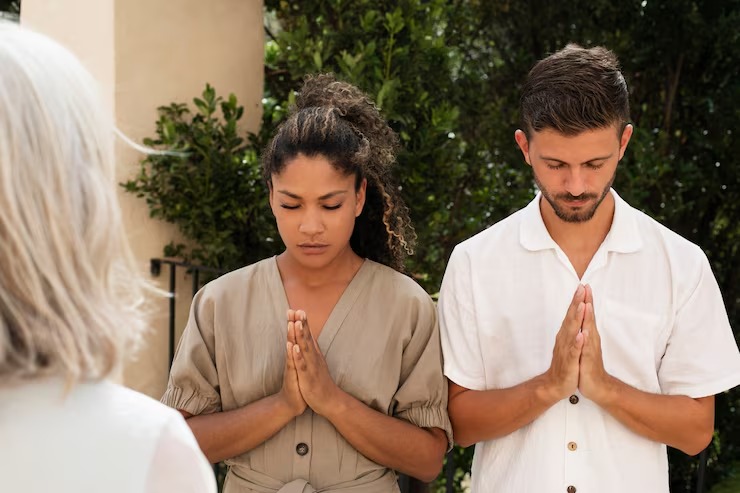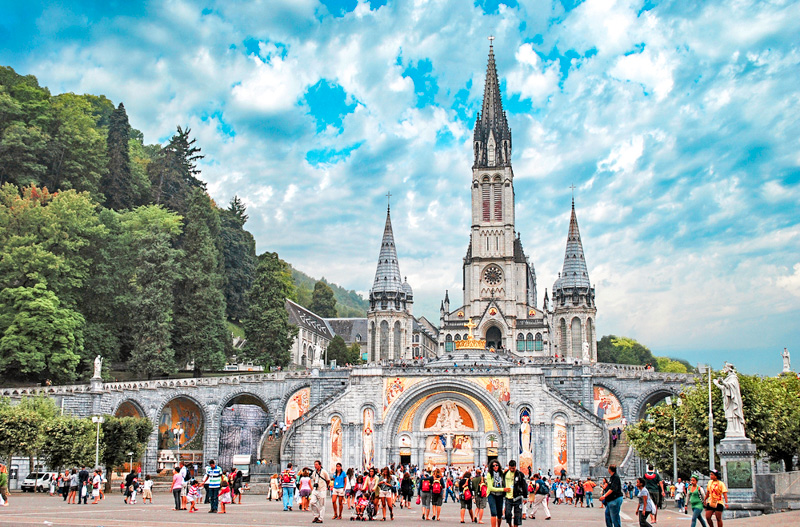Have you ever sat quietly in a park, watching the leaves rustle in the wind, and felt a deep sense of connection to something bigger than yourself? I remember a moment like that from my early twenties. Raised in a strict Catholic household, I followed the rituals—Sunday Mass, confessions, holidays—but it all felt like going through the motions. Then, during a solo hike in the mountains, I experienced this profound inner peace that had nothing to do with church bells or scripture readings. It sparked a question I’ve pondered ever since: What’s the real divide between religion and spirituality? In this article, we’ll dive deep into that, exploring definitions, contrasts, and why understanding them matters for your own journey.
Understanding Religion
Religion often acts as a structured framework for belief, much like a well-organized community club with rules, meetings, and traditions. It’s built around shared doctrines, rituals, and institutions that guide followers toward a higher power or moral code. Think of major world religions like Christianity, Islam, or Hinduism—they provide clear guidelines on how to live, worship, and connect with the divine.
At its core, religion emphasizes community and external practices, such as attending services or following holy texts. This structure can offer comfort and a sense of belonging, especially during tough times. However, it sometimes gets criticized for being rigid, focusing more on adherence than personal insight.
Understanding Spirituality
Spirituality, on the other hand, feels more like an inward adventure, a personal quest to find meaning and connection beyond the everyday grind. It’s about tuning into your inner self, the universe, or a higher energy without needing a formal playbook. People might describe it as feeling “one with everything” during meditation or a quiet walk in nature.
Unlike rigid systems, spirituality encourages exploration and self-discovery, often blending ideas from various sources. It’s flexible, allowing you to define your path based on what resonates with your soul. This approach appeals to those seeking authenticity over tradition.
Key Differences Between Religion and Spirituality
While both religion and spirituality aim to answer life’s big questions—like why we’re here and how to find peace—they approach these in markedly different ways. Religion tends to be collective and rule-bound, whereas spirituality is individualistic and fluid. Let’s break this down further to see how they diverge in practice and philosophy.
Structure and Organization
Religion thrives on organization, with established hierarchies like priests, imams, or rabbis leading the way. It’s like joining a team with uniforms, plays, and a coach—everyone follows the same game plan. This setup fosters community but can feel confining if it doesn’t align with your evolving views.
Spirituality lacks that formal structure; it’s more of a solo journey or small, informal gatherings. You might draw from yoga, mindfulness apps, or personal reflections without any “official” oversight. This freedom allows for creativity but might leave some craving more guidance.
Beliefs and Dogmas
In religion, beliefs are often codified in sacred texts or creeds, such as the Bible’s Ten Commandments or the Quran’s Five Pillars. These provide a clear roadmap, but they can spark debates when interpretations clash. It’s reassuring for many, offering absolute truths in an uncertain world.
Spirituality shuns strict dogmas, favoring personal truths discovered through experience. You could believe in a universal energy rather than a named deity, adapting as you grow. This openness promotes tolerance but might seem vague to those who prefer definitive answers.
Practices and Rituals
Religious practices are ritualistic and communal—think baptisms, prayers at specific times, or fasting during Ramadan. These acts reinforce faith and create shared experiences, strengthening bonds among believers. They’re tangible ways to express devotion.
Spiritual practices are more varied and introspective, like journaling gratitude or practicing breathwork. There’s no “right” way; it’s about what nurtures your inner world. This personalization can lead to profound growth, though it requires self-motivation.
Community vs. Individual Focus
Religion often revolves around community—weekly gatherings, holidays, and support networks that build lasting relationships. It’s heartwarming, like family reunions where everyone shares the same stories. This social aspect helps during life’s hardships.
Spirituality prioritizes the individual, though it can include like-minded groups. It’s akin to a personal diary entry rather than a group chat. This solitude fosters deep self-awareness but might feel isolating without external validation.
Approach to the Divine
Religions typically personify the divine—God, Allah, or multiple gods—with specific ways to connect, like prayer or offerings. This anthropomorphic view makes the abstract feel accessible.
Spirituality sees the divine as an energy or essence within and around us, not necessarily a figure. It’s like sensing electricity in the air rather than flipping a switch. This perspective emphasizes unity over separation.
To visualize these contrasts, here’s a simple comparison table:
| Aspect | Religion | Spirituality |
|---|---|---|
| Structure | Organized, institutional | Personal, flexible |
| Beliefs | Dogmatic, based on scriptures | Experiential, evolving |
| Practices | Rituals, communal | Meditation, self-reflection |
| Focus | Community and tradition | Individual growth |
| Divine Connection | Through intermediaries/rules | Direct, inner experience |
Similarities Between Religion and Spirituality
Despite their differences, religion and spirituality aren’t enemies—they often overlap, like two paths leading to the same mountain peak. Both seek purpose, encourage ethical living, and promote compassion toward others. Many religious people find spiritual depth in their faith, while spiritual seekers might borrow religious tools like prayer.
They also share a quest for transcendence, whether through worship or mindfulness. In my own life, blending Catholic traditions with spiritual meditation created a richer experience. Recognizing these common grounds can bridge divides and foster understanding.
Pros and Cons of Religion
Religion has its strengths and drawbacks, much like any long-standing institution. Here’s a balanced look:
Pros:
- Provides a strong sense of community and support during crises.
- Offers moral guidelines that promote ethical behavior and social harmony.
- Rich in traditions that preserve cultural heritage and family bonds.
- Can inspire charitable acts and global outreach.
Cons:
- May encourage division or judgment toward “outsiders.”
- Rigidity can stifle personal growth or questioning.
- Historical ties to conflicts or scandals erode trust.
- Emphasis on rules might overshadow genuine connection.
Pros and Cons of Spirituality
Spirituality shines in its adaptability but isn’t without challenges. Consider these:
Pros:
- Empowers personal empowerment and self-discovery.
- Promotes inclusivity and tolerance across beliefs.
- Focuses on present-moment awareness for reduced stress.
- Encourages holistic well-being—mind, body, soul.
Cons:
- Lacks structure, leading to confusion or inconsistency.
- Can feel solitary without a built-in community.
- Risk of superficiality if not grounded in practice.
- Harder to pass on to future generations without traditions.
Real-Life Examples and Personal Stories
I once knew a friend named Sarah who grew up in a devout Baptist family. Church was her social hub, but after college, she felt constrained by its expectations. She turned to spirituality, exploring yoga retreats and nature journaling, which reignited her sense of wonder. Today, she blends both—attending services occasionally while maintaining a daily meditation ritual. It’s a reminder that these aren’t mutually exclusive.
Another example: Think of celebrities like Oprah Winfrey, who champions spirituality through her emphasis on inner growth and gratitude, drawing from various traditions without strict religious labels. Or historical figures like Gandhi, whose spiritual quest influenced his religious practices and activism. These stories show how blending or choosing one over the other can lead to fulfillment.
Humorously, religion is like a family recipe passed down generations—reliable but unchangeable. Spirituality? It’s improvising in the kitchen, adding spices as you go, sometimes creating a masterpiece, other times a mess. Both can nourish the soul if approached with an open heart.
People Also Ask: Common Questions Answered
Drawing from real Google searches, here are some frequently asked questions about religion and spirituality:
- Is spirituality a form of religion? Not exactly—spirituality can exist within religion but often stands alone as a personal pursuit without organized elements. It’s like the essence without the packaging.
- Can you be spiritual but not religious? Absolutely. Many people identify as “spiritual but not religious” (SBNR), focusing on inner peace and universal connection without institutional ties. Surveys show this group is growing, especially among millennials.
- Why do some people prefer spirituality over religion? Often due to negative experiences with dogma or hypocrisy in organized faith. Spirituality offers freedom from judgment and emphasizes personal empowerment.
- How does religion incorporate spirituality? Many religions encourage spiritual practices like contemplation or mysticism—think Sufism in Islam or contemplative prayer in Christianity.
- What role does science play in spirituality vs. religion? Spirituality often dialogues with science, like mindfulness studies, while some religions clash over issues like evolution. Both can coexist with open minds.
Where to Explore Religion and Spirituality Further
If you’re navigating this path, start locally. For religion, search for community centers like churches or temples—sites like Meetup.com list groups. Online, platforms such as GotQuestions.org offer navigational resources on faiths.
For spirituality, apps like Insight Timer provide guided meditations. Books such as Eckhart Tolle’s “The Power of Now” serve as tools for deeper exploration. Internal links: Check our guide on starting a meditation practice or finding community in faith.
Best Tools and Resources for Your Journey
Transactional picks: For spirituality, try the Calm app for daily mindfulness—it’s user-friendly and backed by science. Books like “The Untethered Soul” by Michael Singer top lists for inner growth.
For religion, resources like Bible Gateway offer free scripture access. If seeking community, apps like Church Finder help locate nearby groups. Pros: Affordable, accessible. Cons: Overwhelm from options—start small.
FAQ
What are the main benefits of choosing spirituality over religion?
Spirituality offers flexibility and personal relevance, reducing stress through practices like meditation. It avoids dogma, fostering inclusivity. However, it might lack the community support religion provides.
How can religion enhance spiritual growth?
Religion supplies tools like rituals and teachings that deepen spiritual experiences. Many find profound insights in communal worship or study groups.
Is there a way to blend religion and spirituality?
Yes—many do, using religious frameworks for structure while pursuing personal spiritual depth. It’s about balance, like my own mix of traditions and introspection.
Why do some view religion negatively compared to spirituality?
Often due to historical abuses or rigidity, leading to perceptions of control versus freedom. But positive aspects, like charity, shouldn’t be overlooked.
Can spirituality lead to religion or vice versa?
Definitely. A spiritual awakening might draw someone to a faith community, or religious doubts could spark a broader spiritual search.
In wrapping up, the difference between religion and spirituality boils down to structure versus freedom, community versus individuality. Neither is inherently better—they’re tools for navigating life’s mysteries. Reflect on what resonates with you; perhaps share your story in the comments. For more, explore Psychology Today’s take on spirituality. Your journey is uniquely yours—embrace it with curiosity and kindness. (Word count: 2,756)




